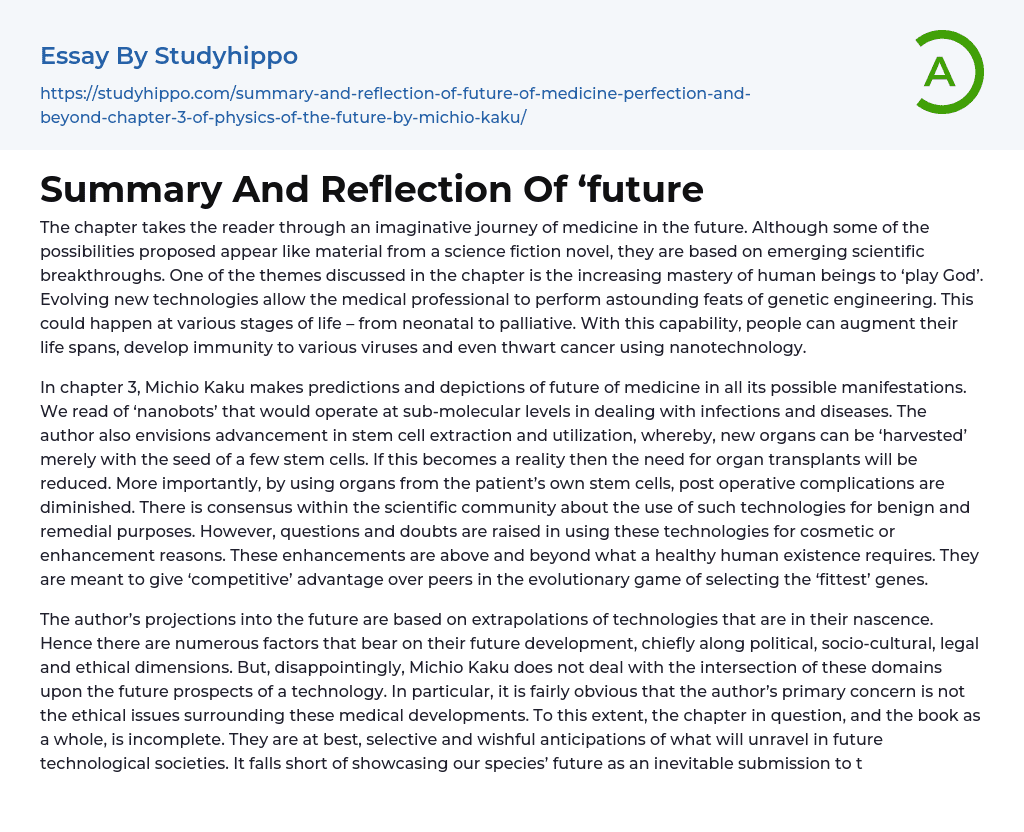The chapter delves into a fascinating glimpse of upcoming medical possibilities. Although some concepts may initially resemble ideas from a science fiction novel, they are genuinely based on emerging scientific progress. The chapter examines the idea of humans attaining more control over existence, essentially "playing God". Technological advancements allow healthcare experts to accomplish astonishing feats of genetic manipulation. These capabilities can be utilized at various points in life, ranging from infancy to end-of-life treatment. This newfound potential enables individuals to extend their lifespans, acquire resistance against diverse viruses, and even fight cancer through the assistance of nanotechnology.
In chapter 3 of his book, Michio Kaku discusses the future of medicine. He predicts that 'nanobots' could be used to treat infections and diseases at a sub-molecular level. This would be achieved by utilizing advancements in stem cell extraction
...and utilization, leading to the creation of new organs using only a small number of stem cells. If this becomes reality, it would reduce the need for organ transplants and minimize complications after surgery by using the patient's own stem cells.
However, concerns arise when considering these technologies for cosmetic purposes or enhancements. These enhancements go beyond what is necessary for maintaining a healthy human existence and instead aim to provide individuals with a competitive advantage in terms of selecting advantageous genes through evolution.
The author’s predictions about the future are based on projections of emerging technologies. However, there are various factors that influence the development of these technologies, including political, socio-cultural, legal, and ethical dimensions. Unfortunately, Michio Kaku does not discuss how these domains intersect and impact the future potential of technology. The author's main focus appears to be
on aspects other than the ethical implications of medical advancements. This chapter and the entire book are therefore incomplete in addressing this issue. They provide selective and hopeful expectations of what will happen in future technological societies, but fail to fully illustrate our species' inevitable surrender to technocracy.
Although lacking factual information, the work remains an intriguing read; it should not be entirely disregarded as it provides valuable insights into recent technological advancements. For individuals unfamiliar with scientific terms, comprehending these concepts can be challenging. Nevertheless, the author deserves commendation for employing minimal jargon and offering clear explanations and logical arguments. Ultimately, reading this chapter will prove both exhilarating and thought-provoking for readers, much like my own experience.
Reference:
Kaku, Michio (March 2011). "Physics of the Future: How Science Will Shape Human Destiny And Our Daily Lives by the Year 2100." Doubleday.
The author of this chapter offers a creative outlook on the future of medicine, integrating emerging scientific discoveries. Despite appearing fantastical, these ideas are rooted in genuine scientific progress. A key emphasis is on how advancements in technology enable humans to take on godlike roles within the medical field. From infancy to end-of-life treatment, medical experts can now accomplish extraordinary feats through genetic engineering. This newfound power allows individuals to prolong their lives, acquire resistance to viruses, and combat cancer with the aid of nanotechnology.
In chapter 3 of Michio Kaku's book, he explores the future of medicine and presents several predictions. These include the development of 'nanobots' capable of specifically targeting infections and diseases at a sub-molecular level. Furthermore, Kaku imagines progress in stem cell extraction and usage, which could potentially result in the generation of
fresh organs.
- Microbiology essays
- Bacteria essays
- Cell essays
- Enzyme essays
- Photosynthesis essays
- Plant essays
- Natural Selection essays
- Protein essays
- Viruses essays
- Cell Membrane essays
- Human essays
- Stem Cell essays
- Breeding essays
- Biotechnology essays
- Cystic Fibrosis essays
- Tree essays
- Seed essays
- Coronavirus essays
- Zika Virus essays
- Agriculture essays
- Albert einstein essays
- Animals essays
- Archaeology essays
- Bear essays
- Biology essays
- Birds essays
- Butterfly essays
- Cat essays
- Charles Darwin essays
- Chemistry essays
- Dinosaur essays
- Discovery essays
- Dolphin essays
- Elephant essays
- Eli Whitney essays
- Environmental Science essays
- Evolution essays
- Fish essays
- Genetics essays
- Horse essays
- Human Evolution essays
- Isaac Newton essays
- Journal essays
- Linguistics essays
- Lion essays
- Logic essays
- Mars essays
- Methodology essays
- Mineralogy essays
- Monkey essays




